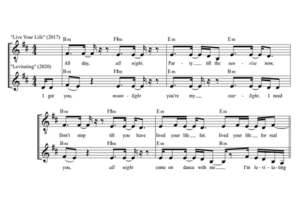Policing Copyrights: Dua Lipa Sued for Allegedly Plagiarizing “Levitating”
We often get asked: Just how exactly does one prevail at trial in a copyright litigation? To what degree of likeness do songs have to have in order to be considered a copy?
Forensic musicology is the means by which parties can offer evidence in copyright disputes. Forensic musicologists analyze melody, harmony, rhythm, and orchestration to compare similarities between two songs. In civil matters, this analysis is submitted in an “expert opinion.”
Large recording studios will have several forensic musicologists on staff that are charged with clearing songs before their release. These studios do not want to invest a ton of money into making music, only later to be sued. It is not uncommon that songwriters are inspired by other works, even unconsciously.
Copyright lawsuits involving music have increasingly relied on forensics to appear more objective. However, forensics are complex, and this complexity can make the outcome of lawsuits somewhat unpredictable, especially if tried before a jury of lay persons. Therefore, to mitigate risk associated with the unpredictability of the suit, artists faced with lawsuits for copyright infringement may feel pressure to settle the case. If settled quickly, these artists can often avoid high legal fees that accrue during the lawsuit.
Giving attribution and/or royalties to another party after a song has been released is becoming somewhat of a norm in the music industry. The original songwriting origins of Katy Perry’s “Dark Horse,” Robin Thicke and Pharrell’s “Blurred Lines”, Led Zeppelin’s “Stairway to Heaven” have been called into question. Sam Smith’s “Stay With Me” retroactively awarded Tom Petty a songwriting credit due to similarities with “I Won’t Back Down”. Bruno Mars’ “Uptown Funk” saw songwriters retroactively added to their credits, twice. Even up and coming artists like Olivia Rodrigo have recently been provoked into awarding Taylor Swift songwriting credits for her song “Déjà Vu” and Paramore songwriting credits for her song “Good 4 U”.
Dua Lipa’s “Levitating” is merely the latest song to come under fire for having questionable songwriting origins, with reggae act Artikal Sound System accusing Dua Lipa and her Warner Records songwriting team of plagiarizing their 2017 song, “Live Your Life.”
As an example of how a forensic comparison amongst these songs might be made, Dr. Jeremey Orosz (PhD, University of Minnesota) recently annotated and compared excerpts of the score for both songs as follows:

Dr. Orosz writes:
“Looking only at these excerpts of each song, this might seem like an open-and-shut case. The chorus of ‘Levitating’ and ‘Live Your Life’ do have a lot in common: They feature the same chord progression in the same key. The vocal melodies of each include many of the same notes and rhythms. And there are even similarities in the lyrics; both use the words ‘all night’ and reference other features of the night sky (moonlight, etc.). Given the extent of the overlap between them as revealed through comparative analysis, it’s easy to assume that the writers of ‘Levitating’ simply must have heard ‘Live Your Life.’
Despite the similarity between these two examples, there is equally strong evidence to the contrary. In an interview about the case with Rolling Stone, Berklee College of Music professor and forensic musicologist Joe Bennett notes that the passage in question is rather short. As there are only three or so measures with truly notable similarity, he said on March 4 that he believes this case to be an ‘interesting coincidence,’ adding that ‘coincidental similarity is more common than people think it is.’ Besides, Bennett argues, plenty of other songs use this chord progression, like No Doubt’s ‘Don’t Speak’ and Helloween’s ‘Forever and One.’”
You can read the entirety of Dr. Orosz’s exceptional commentary on the pending Dua Lipa copyright litigation, published by Slate.com, here.
Since 1924, MVS represents many musicians, authors, painters, and other artists in procuring copyrights in expressions of their work and in enforcing those copyrights. If you have any questions regarding your copyright matters you can visit www.ipmvs.com for additional information, call us at 515-288-3667 and ask for a copyright expert, or contact Lars directly via email at gregory.gunnerson@ipmvs.com.
Gregory Lars Gunnerson is an Intellectual Property Attorney in the Mechanical and Electrical Patent Practice Groups at McKee, Voorhees & Sease, PLC.
← Return to Filewrapper